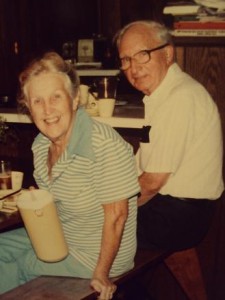With four boys in the family, our driveway saw a steady stream of interesting and needy vehicles come and go. Each first-car was purchased with only hundreds of dollars rather than thousands and was sometimes held together with tape, wire and bungee cords.
By the time our younger girls needed wheels, their brothers were experienced bargain-hunters and facilitated the purchase of Louisa’s sky-blue Honda Accord, which she later sold to Birgitta. Despite the car being 13 years old, the boys assured the girls it was in its prime with “only” 145,000 miles, good for 200,000 more.
The little Honda has banked 72,000 toward those 200,000 without an issue until recently when the hood latch let go on the highway, flinging the hood up over the windshield with such force it shattered all the glass, bent the window frame and cracked the roof. (“In Sync with God,” June 7, 2011)
Because the incident occurred on a superhighway, police insisted the car be towed off the premises within 20 minutes. It was a high pressure situation during which Birgitta was traumatized, and I was missing Nate’s important input.
Towed to a body shop, the Accord appeared to be damaged beyond its humble value, so we let it go in exchange for tow fees and storage charges. But once I was back in Michigan, Klaus said, “Mom, you made the wrong call. The engine was still good.”
He arranged to have it free-towed 100 miles to Michigan where his buddy fixed it for under $400. It isn’t perfect but is quite acceptable. Then came the fun part: surprising Birgitta, which occurred this weekend.
As we arrived home well after midnight I said, “Remember the surprise I said you were getting? Well, there it is.”
“Where?” she said, looking around inside my car.
“Out the front window,” I said, watching her eyes squint in the dark. When she recognized her blue car, she covered her mouth with her hand, spit out a few words in an attempt to say what she was thinking, and squealed with delight. “My car! Is it my car? Is it still broken? Is it fixed?”
It was a spectacular surprise, thanks to Klaus, better than the best 4th of July fireworks show. Birgitta’s appreciation for her wheels has sky-rocketed, because what once was gone has been restored.
The whole thing reminds me of the three biblical stories Jesus told, one after the other, about restoration: the lost sheep, lost coin and lost son. (Luke 15) In each case the “find” generated a celebration. But Jesus made it clear he’d only told those stories to demonstrate one thing: that jubilant feeling of finding what was lost is exactly his feeling when someone repents of sin and comes to salvation.
After watching Birgitta get her car back, we know how that feels. And it feels really good!
“In the same way, I tell you, there is rejoicing in the presence of the angels of God over one sinner who repents.” (Luke 15:10)






